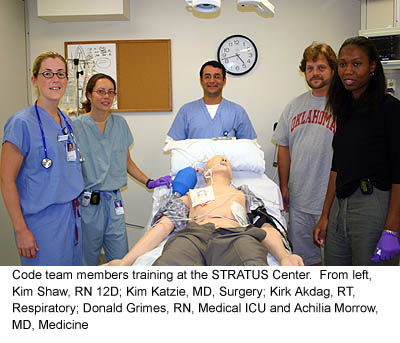Nursing Role in the Code Process

Code process continually undergoes improvement to provide the most timely and
effective emergency care throughout the hospital, and nurses are an essential
part of that process.
Created three years ago by the standing CPR Committee, the code team is a multidisciplinary
effort based on BWH data as well as national research on successful emergency
response efforts. A tower team handles inpatients and a separately organized ED
team handles outpatients. According to Judith Perron, RN, MSN, “One of the
critically important things the committee had to determine was how best to utilize
nurses on the team,” she said.
After collecting and examining data on BWH codes and discussions from throughout
the hospital, the committee structured a tower code team made up of respiratory
therapists, residents in medicine, surgery and anesthesia and a 12D cardiac nurse
who is dedicated to the team.
From her vantage point as 12D day nurse in charge, Suzanne Lieberman has staffed
many of the code responses since the team was formed three years ago. She is also
a newly appointed member of the CPR committee. “Cardiac care nurses are
a good fit on the team because of their day-to-day patient experience, use of
defibrillators and administering medication,” she said. She also credited
the team’s cross training in enabling members to do their own roles and
others on a team whose members constantly change. As of this summer, tower code
team members are participating in Stratus Center emergency preparedness simulations.
Mary Lou Moore, nurse manager on 12D said, “It has been incredibly helpful
to have a consistent set of nurses participating during inpatient codes. Trained
in cardiopulmonary nursing, they are in a position to synthesize their experiences
with one another, evaluate everything from process to equipment to performance
and give valuable feedback to the committee for quality improvement.
The current tower code team coordinator – Patricia Crispi, RN, BSN, CCRN
who among other roles, works with the code team to ensure detailed and accurate
data is recorded for each event. This element has become increasingly important
to the code effort because it enables the CPR Committee to analyze what went well
and what future improvements need to be made. BWH is also a participating member
of The American Heart Association’s National Registry of Cardio-Pulmonary
Resuscitation (NRCPR) that reports on national code response trends based on data
collected from hospitals around the US.
“Nurses are an integral part of the code teams. We are continually seeking
ways to enable swift, smooth and effective responses that achieve the best outcomes,”
said Jeffrey Rothschild, MD, director of the code team. “The experience
and perspective of nursing team members has been essential in helping us move
forward on these goals,” he said.